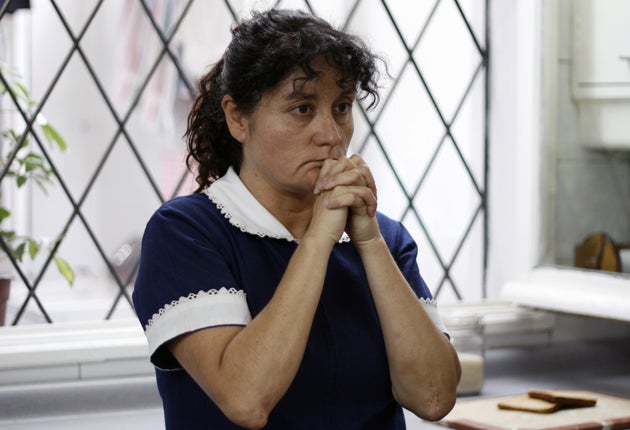The Maid, Sebastian Silva, 94 mins (15)
The unnerving presence in the household of the remarkable Catalina Saavedra carries an absurdist, black, domestic comedy

Sebastian Silva's The Maid is an absurdist black comedy – or perhaps a perfectly realistic drama – about what it's like to be (or to employ) a domestic servant in contemporary Latin America.
The protagonist of this low-budget Chilean film is Raquel (Catalina Saavedra), a 41-year-old woman who has spent more than 20 years as a maid in a middle-class household. Raquel is part of the family, both she and her employers remark. But then "part of the family" means different things, depending on who says it – those in power, or those without it. Not that it's entirely clear who has the real power in this house.
The film never quite explains the state of things in this family: it never tells us why Raquel seems profoundly hostile to eldest child Camila, maintaining a terse policy of non-cooperation, while smilingly indulging the teenage son. Nor does Silva condemn the family, gauche and spoilt as they are. He presents mother Pilar (Claudia Celedón) as patient and confused, but is clearly less fond of her husband Mundo (Alejandro Goic), a smug dork whose only real occupation, as far as we can see, is to tinker upstairs with his model sailing ships (when he proudly completes one after a year's work, you can't expect it to last long in this war zone).
Something has to give – both in the balance of the household and, by implication, in the Latin American social system. The first sign of breakdown comes when Raquel faints. Pilar reasonably, if tactlessly, suggests getting someone else in to help – but fiercely territorial Raquel won't hear of it. A shy young Peruvian is the first to get the rough treatment, Raquel locking her outside the house at the first opportunity. The family's cut-glass snob of a grandmother sends in a replacement – a sour, no-nonsense older woman who scorns Raquel's sense of duty: "Why do you make such an effort for these ingrates?" Raquel makes short work of her too.
Then in comes a younger woman, Lucy (Mariana Loyola); she reacts to being locked in the garden by sunbathing topless, which is one way of
breaking the ice. It's Lucy who asks Raquel the questions that we're longing to ask: "What happened to you? What did they do to you?"
But perhaps it's not specifically what this family has done to Raquel – rather, what the system of privilege and exploitation does to servants in general. Still, plenty about Raquel in particular remains obscure – for example, why her family background is so painful to her.
More perplexing – giving the film its slight edge of Buñuel-style absurdism – is the fact that Raquel gets away with everything she does, no matter how outrageous. The members of this family fall over themselves to appease her, Pilar wringing her hands outside Raquel's door. She's part of the family, after all – or rather, she's a fact of life, the inadmissible secret of the bourgeois status quo.
In the end, The Maid is not quite as satirically trenchant as it promises. If there's something slightly underdone about the film, it's partly because Silva opts for a quasi-documentary flavour, shooting on video in his own parents' house. But the hand-held photography and bland textures make the film both visually drab and under-styled as drama, when its satirical edge might have been sharpened by the crispness and control of, say, the recent Greek domestic nightmare Dogtooth.

Watch Apple TV+ free for 7 days
New subscribers only. £8.99/mo. after free trial. Plan auto-renews until cancelled

Watch Apple TV+ free for 7 days
New subscribers only. £8.99/mo. after free trial. Plan auto-renews until cancelled
As it happens, Catalina Saavedra's performance more than carries the film. Stooped, compact, as if compressing a great emotional and physical force, Saavedra proves an unnerving presence, making the sullenly taciturn Raquel a true enigma.
We can see the almighty resentment in Raquel, but when she tries on a gorilla mask, we sense the atavistic instincts of a mother animal: we know she is guarding her own terrain, but she seems to be guarding the family too from outsiders, taking her role as domestic protector to extremes. We genuinely don't know who Raquel is; and part of Silva's argument being that, if a woman is essentially kept in captivity for years, she herself may not know either.
A tartly ambivalent ending suggests that, thanks to Lucy, Raquel has achieved a kind of liberation – or possibly, just found a new prison of identity for herself. Either way, it's the look of blank self-containedness on Saavedra's four-square features that puts the final teasing stamp on this quietly effective provocation of a film.
Next Week:
Jonathan Romney heads to the sun for Certified Copy, a Tuscan jaunt for Juliette Binoche and Iranian auteur-poet-photographer-painter- designer Abbas Kiarostami
Subscribe to Independent Premium to bookmark this article
Want to bookmark your favourite articles and stories to read or reference later? Start your Independent Premium subscription today.

Join our commenting forum
Join thought-provoking conversations, follow other Independent readers and see their replies